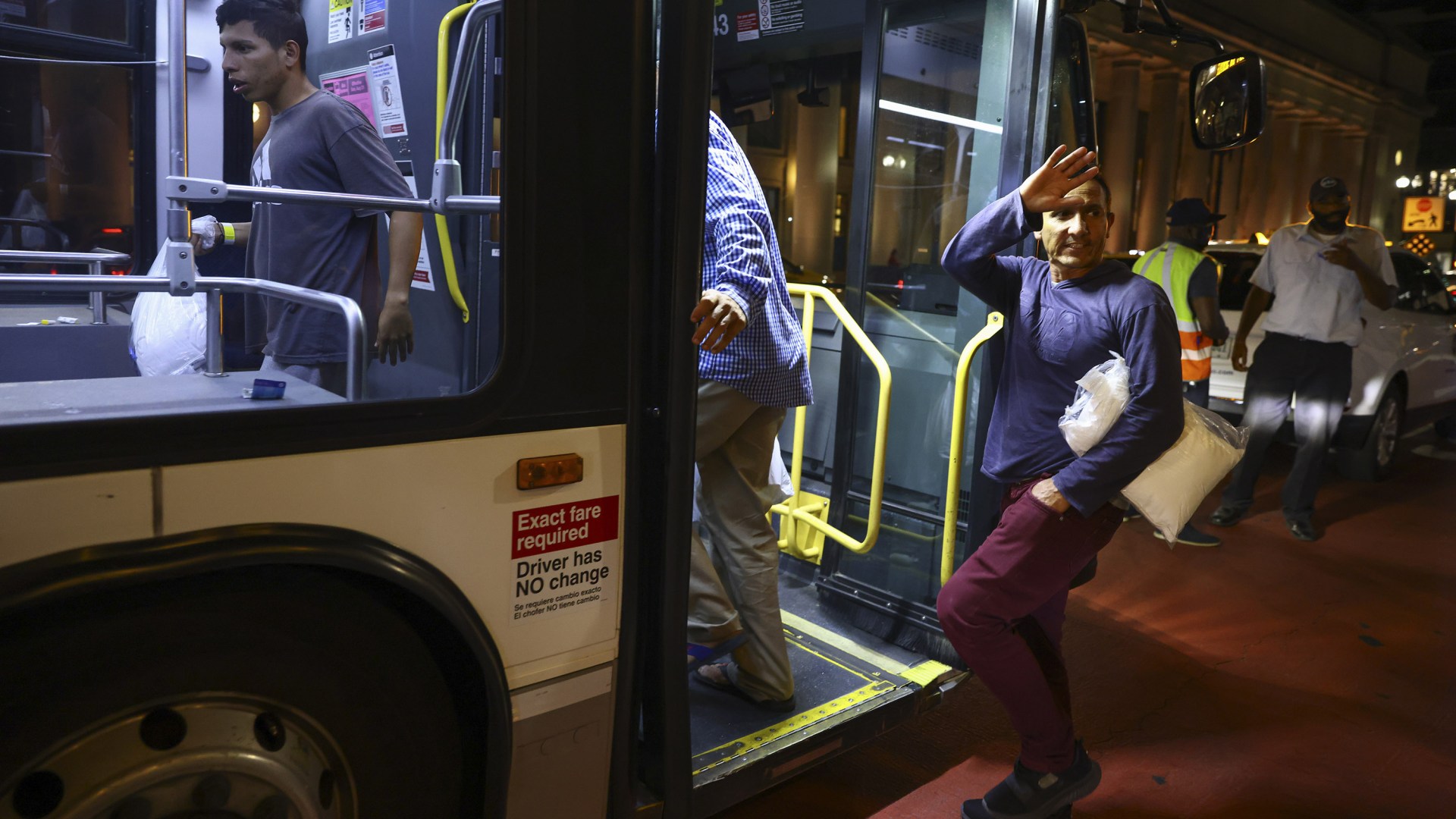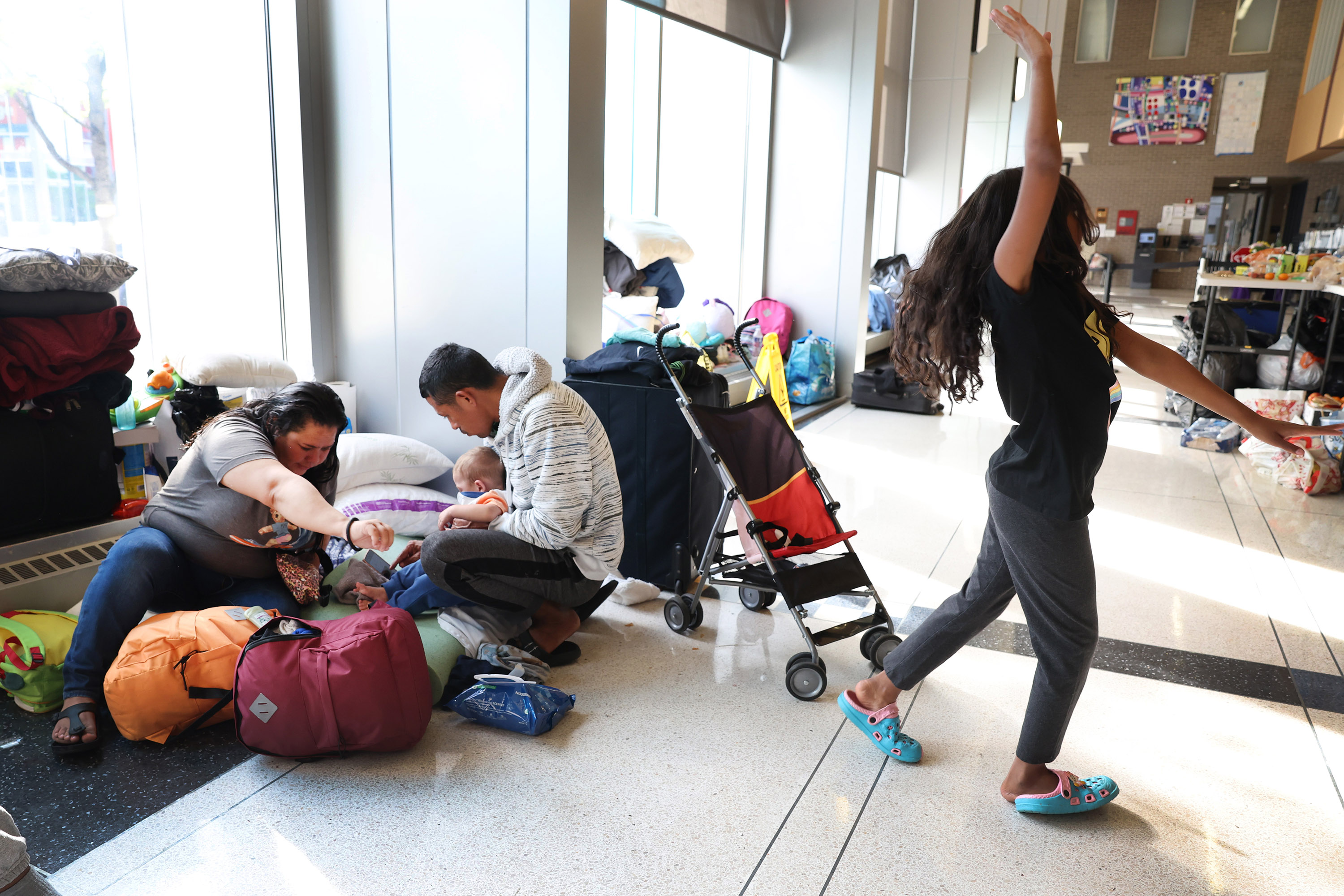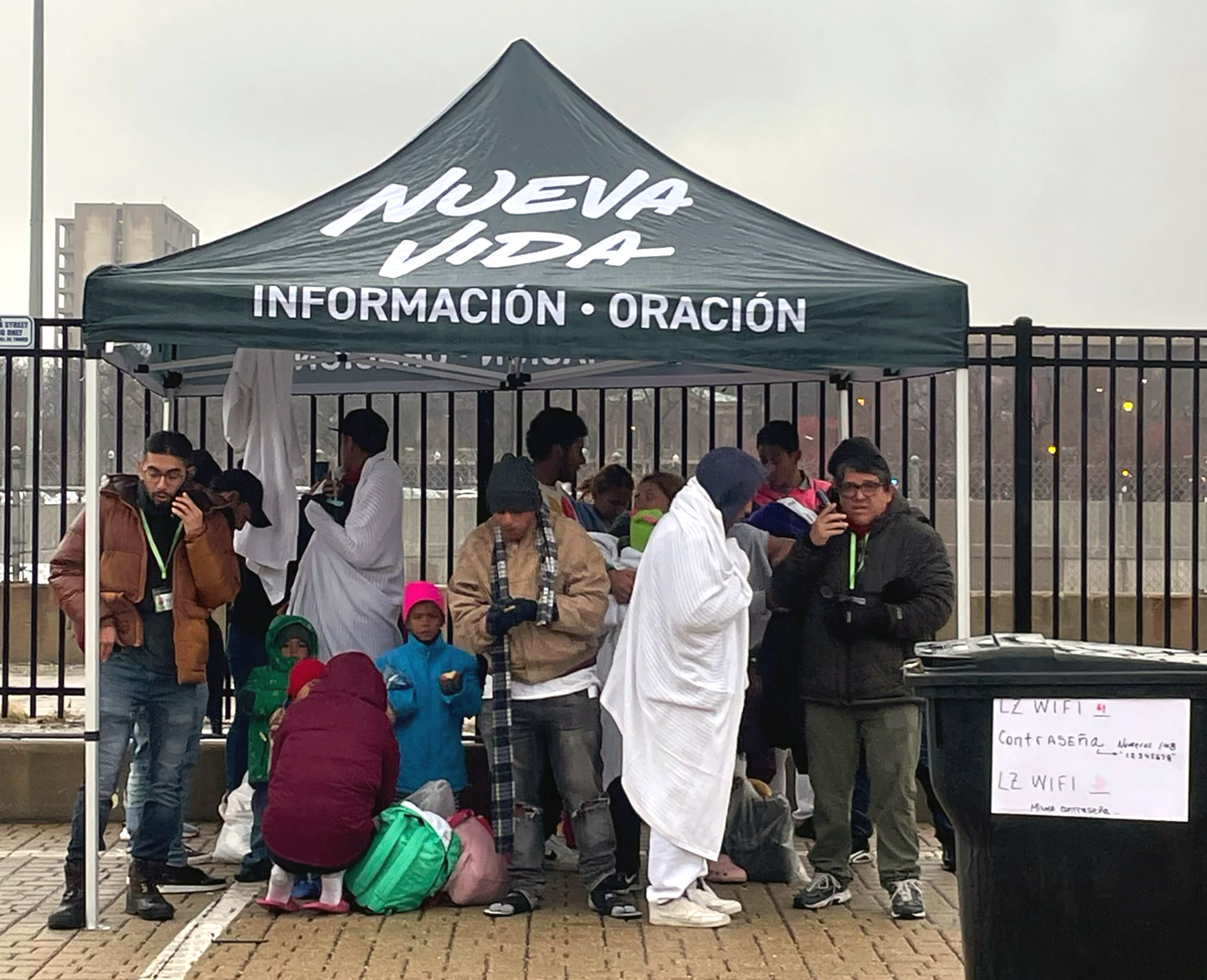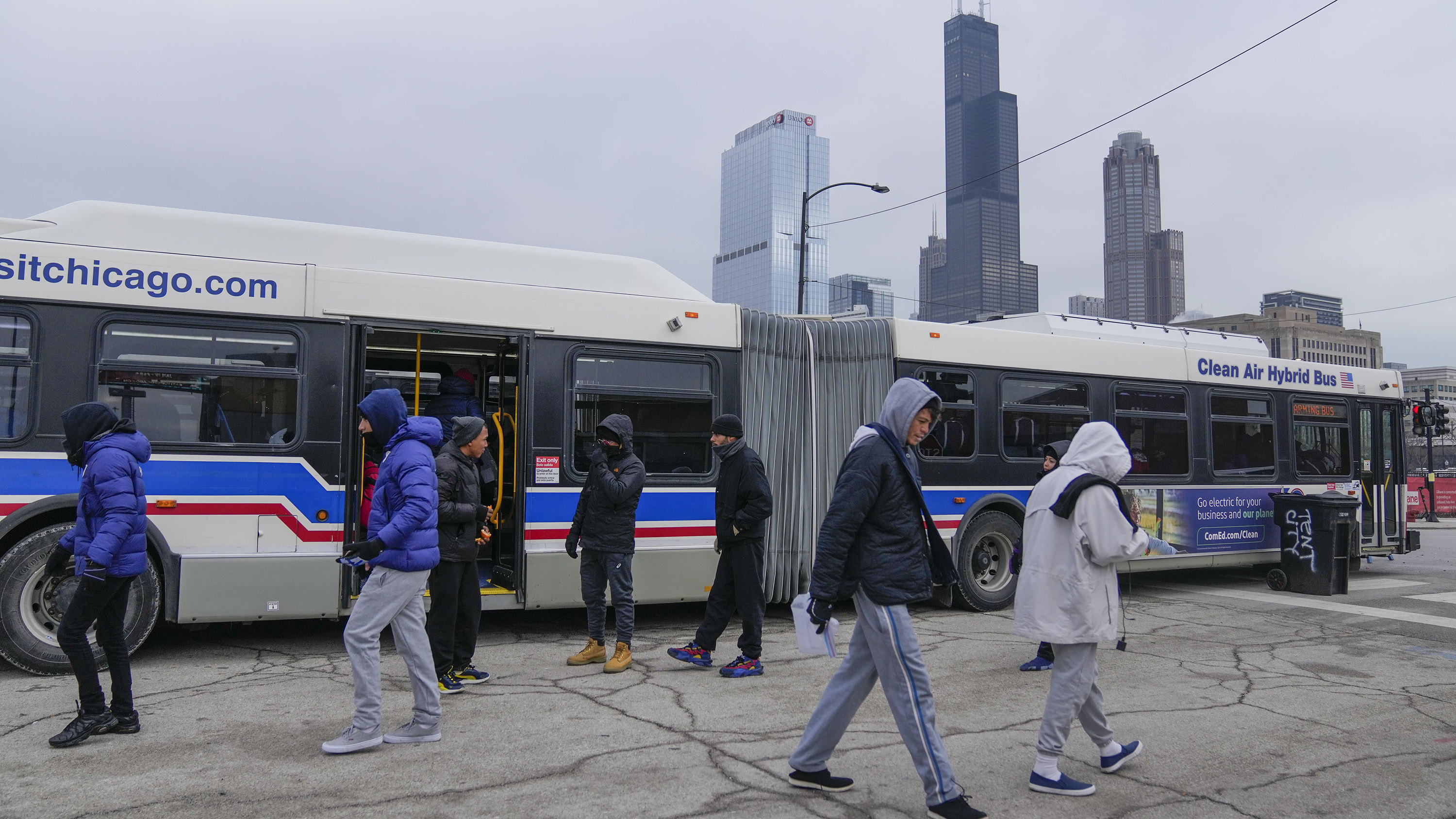On a September morning in 2022, Jay Kim pulled into the parking lot of the Chicago-area church where he works and spotted a huddle of unfamiliar people standing near the edge of the property. When he climbed out of his car, two women from the group approached him, speaking in Spanish.
Kim, the outreach pastor at CityLine Bible Church in Niles, Illinois, understood only a little of what they were saying. They were new to Chicago. They were living temporarily at a Holiday Inn a couple miles down the road. Kim invited them inside the church to talk with another pastor, Eddie Rivera, who spoke Spanish and could help figure out what they wanted.
What the group wanted, it turned out, was work. They had come from Venezuela, they explained to Kim and Rivera. They had traveled through Central America and Mexico and into Texas, stripped by thieves and trials of everything but their clothes. They had arrived in Chicago on a bus the day before. They understood that the government—who exactly that meant, they could not be sure—was putting them up in a hotel. Maybe for days or maybe for weeks. After that, for all they knew, they could be on the street.
“They had been out about an hour, walking around, looking for work,” Kim said. “They were desperate.”
Kim and Rivera did what many pastors would: They gathered groceries from CityLine’s food pantry and clothing from a stockpile of donations. They packed them into a van, and Kim ferried the families back to the Holiday Inn.
A couple of days later, on a Friday morning, five more men appeared at the church. They, too, were staying at the hotel. When Kim drove them back, he learned that the hotel was housing perhaps a hundred migrants, mostly Venezuelan. Before he drove away, Kim told the men to invite their friends to church. He said the church could pick up anyone who needed a ride.
It was the kind of semi-impulsive act that CityLine’s lead pastor, Mohan Zachariah, encouraged: Take meaningful risks and see what happens. “We’re going to take a step out if the Lord brings something to us,” Zachariah had told them. Sometimes, for a church to grow, you have to welcome a stranger in a parking lot.
CityLine pastors and other ministry leaders in Chicago say that when they opened their doors to migrants who surged into the city during that time, something like revival came.
But nearly three years later, another stranger in another church parking lot cast those early days of outreach in a different light. In June of this year, CityLine’s leaders were scrolling through news of protests in Los Angeles against the Trump administration’s deportation efforts when they saw stories about masked federal agents arresting a man in an apparent immigration raid outside a Los Angeles–area church. Pastors there asked the agents to leave the church property, and one of the agents allegedly drew a gun. One shouted, “The whole country is our property.”
Now, two weeks after President Donald Trump ordered immigration agents to step up deportation efforts in Chicago and other major cities, pastors like Kim wonder: Can a revival survive what else is coming?
“They believe they can go anywhere and take any person,” Kim said. “No one can stop them.”
If the Lord flooded Chicago with migrants, he did so at the hands of both Republicans and Democrats.
Early in 2022, migrants—largely from Venezuela—were crossing the border into Texas by the tens of thousands, turning themselves in to authorities and beginning the long process of applying for asylum. With federal detention facilities overwhelmed, Customs and Border Protection released most of the migrants onto the street.
Texas governor Greg Abbott, a Republican, directed state employees to usher migrants in border towns onto chartered buses and flights, dispatching them to a handful of cities led by Democrats. Over the next two years, more than 2,600 buses carried almost 120,000 migrants out of the state. At least 41,000 went to New York. More than 17,000 went to Denver.
Progressive critics pounced, but they tended to overlook a similar—if smaller—program created by El Paso, Texas, mayor Oscar Leeser, a Democrat, which also bused thousands of Venezuelans north.
In Chicago, the buses delivered more than 33,000 migrants. (The city’s official count includes arrivals by airplane and is over 50,000.) The influx strained resources and tested compassion, which Abbott has boasted were explicit aims of his relocation program. Migrants slept in tents, on police station floors, in empty corridors of O’Hare International Airport, and on city buses. The city’s efforts to help them provoked outcries from some longtime residents.
But when CityLine’s pastors stumbled upon the migrants at the hotel, they took it as an answer to prayer.
In the summer of 2022, Kim began hearing stories about ministries and social-services agencies scrambling to help the waves of arrivals. He prayed for the migrants and asked around about how CityLine could get involved. “Nobody really had answers,” Kim said. “At that point, it was chaos.”
So he waited. And then, in September, the migrants came to him.
Chicago housed single men and women at various migrant shelters. But like other destinations for the Texas exodus, Chicago, together with the state of Illinois, contracted with hotels across the region to house migrant families. One of those hotels was the Holiday Inn in Skokie, near CityLine Church.
Early on the Sunday morning after Kim and Rivera first visited the hotel, they found about 30 migrants waiting outside before the 9 a.m. worship service. Men, women, and children had made the 40-minute walk. The church sent vans to the hotel to pick up more, and by the start of the church’s 11:15 service, the crowd had grown to around 50.
No one knew quite what to do. The church arranged chairs in a room separate from the main sanctuary and streamed the worship service to a screen while Rivera tried to interpret. But translating worship music was awkward. So the pastors fetched a bilingual guitarist from among the congregation. Could he lead a few songs in Spanish on the spot?
By the second service, the room was overcrowded. Rivera improvised a sermonette—his first time preaching in Spanish.
Over the following month, the number of migrants showing up for church nearly doubled by the week. More than 100 came for Rivera’s second Sunday preaching. Around 220 came the third Sunday. Soon attendance at the church’s impromptu Spanish-language worship hit 300. Dozens of migrants came to faith, according to the church.
“From zero Spanish to 300. That’s a lot,” Rivera said.
CityLine is not small; it averages 1,400 attendees a week. Even so, the birth of a new congregation virtually overnight sent the church scrambling. It launched a full-fledged afternoon service in Spanish, turning through a roster of guest preachers. Many weeks, it provided lunch after the service—sometimes catered, sometimes prepared by church members. It bought two more vans for the shuttle service it was now running between the church and the Holiday Inn.
Pastors put out a church-wide call for volunteers: “We were like, ‘You don’t have to speak Spanish,’” Rivera said. More than a hundred people stepped up. They tended migrant toddlers in the children’s ministry. They chauffeured migrants in their own cars, communicating with Google Translate. They helped open CityLine Closet, sorting donated clothing, and they gave to the church food pantry.
Kim knew that people bring mixed motives to worship; much of the explosive growth came from migrants’ basic need to survive. “A lot of it’s out of desperation from a lot of the families that had heard what we were doing—this food, this clothing—and so they’re trying to make their way over,” he said.
All the same, Kim said, “I strongly believe God sent them.” If that was true, what choice did he have but to receive them?
“This just fell in our lap,” Rivera said. “It was the Holy Spirit who said, ‘Here you go: Spanish ministry. Figure it out.’”
 Photo by Scott Olson/Getty Images
Photo by Scott Olson/Getty ImagesLely might never have come to CityLine, because she was planning to get on a bus to New York.
In the early fall of 2022, Lely walked across the dry Rio Grande riverbed and entered El Paso with her husband and their three young children. It was the culmination of a yearslong flight from Venezuela, in which they fled privation in their homeland, paused for a while in Ecuador, then followed a well-worn path that began on foot in sweltering jungle and terminated, eventually, in a cold holding cell in a Border Patrol facility.
After their release from detention, a local pastor told the family about buses that offered free rides to New York and Chicago. They immediately set their sights on New York, but other migrants warned against it. The city is immense. Prices are insane. Too many people had already gone there. Better to go to Chicago.
Lely, a pastor’s daughter who asked to be identified by a nickname, knew almost nothing about Chicago. She’d seen in movies that it had dangerous parts. But as the family lined up in a building where migrants were sorting themselves by their destinations, Lely found herself standing at a table to register for a Chicago-bound bus. Her family took snacks and waited in a cavernous auditorium among tired people arrayed in endless rows of chairs. Then someone shouted out that the next bus was leaving for Chicago. “We got on that bus to the unknown,” Lely said in Spanish.
To board a bus to Chicago was to roll the dice. Some days, buses departed Texas every few hours, scattering migrants like seeds in any suburb with a train station: Hinsdale. Woodstock. Joliet. City councils passed ordinances forbidding unauthorized buses from unloading within their borders, laws that bus companies sometimes ignored.
The ride took 18 hours. Lely and her husband had no money even to buy crackers for their children. But at rest stops along the way, strangers appeared and asked if they were hungry and handed them pizza and candy.
When the bus stopped for good, it deposited the family in front of a hotel in downtown Chicago at the bottom of a canyon of glass and concrete. They were instructed to wait outside, and all Lely could think about was how cold it was. “Horrible,” she said. “I had no idea where we were.” Someone pulled up in another vehicle and escorted them to a clinic so a doctor could examine the children. Then the family was driven to a Salvation Army shelter on the south side, where they would sleep until their strange new city provided another set of instructions.
To reduce confusing arrivals like these, Chicago officials designated a migrant landing zone, a cluster of tents in a parking lot nestled beside Interstate 90, where bus doors opened to the buzz of the freeway. The site became ground zero for Chicago’s migrant crisis, and Andre Gordillo was soon at the center of it.
Gordillo leads outreach to migrants at New Life Centers, a social-services ministry affiliated with New Life Church. He and his staff, along with hundreds of volunteers, memorized talking points in English and Spanish and greeted passengers as they spilled from buses. Migrants would get pulled into a tent, Gordillo said. “Let’s get you fed and a coat. And in the second tent, while you eat a banana and put on socks, here’s the reality in Chicago: We can help you this way, but we can’t help you that way.”
New Life Centers quickly became one of Chicago’s leading partners in processing migrants. The organization has housed many of them in its two shelters, with combined capacity for 1,700 people. Gordillo’s team has helped move more than 5,000 families from shelters, to hotels, and into apartments, and they’ve warehoused and delivered donated furniture across the city. “We’re almost like Amazon,” Gordillo said. At one point in late 2023, “we were doing 75 moves a day.”
Gordillo has seen over and over how migrant families finally reach their destination in Chicago only to realize their struggle is just beginning. The trauma hits after they’ve thanked someone for the furniture and bolted the door.
“They’re hungry—not just physically but spiritually,” he said. They want to “get settled in, to start anew, to lay down roots, to come into community.”
Lely and her family spent two nights at the Salvation Army center. Then someone told them they were being assigned to a hotel in a place called Skokie. A Holiday Inn. Lely was stunned by all of it: a free cross-country trip on an air-conditioned bus, strangers buying meals, a complimentary hotel that even had a pool. She had heard of Venezuelans going hungry on American streets or living in shelters for a month, and she had braced for as much. “I never imagined that so many good things would happen,” she said.
But Lely felt that at any moment the world could crumble around them. They still had no money or food. None of the other Venezuelans at the hotel knew how long they would be allowed to stay there. Almost as soon as Lely’s family arrived, her husband began walking the neighborhood and knocking on restaurant doors, asking about work. The Holiday Inn provided some meals—cereal, eggs, breakfast sausage, microwaveable vegetables—but they soon made Lely feel sick. She lost weight.
The family was also lonely. They were constantly being watched, and tensions rose between the Venezuelans and other hotel customers. In online reviews, guests complained that “illegal immigrants were openly being vaccinated in the main sitting area outside Bar Louie’s,” referring to the hotel restaurant. Another guest wrote on TripAdvisor, “My family felt extremely uncomfortable.”
Lely’s husband was unusually fortunate: He managed to find work within days, cleaning a few hours a week at a restaurant across the street from the hotel. With their first income in months, Lely bought a griddle so she could cook arepas—finally, something homemade.
After they’d been at the hotel nearly a month, one of the other Venezuelans came back from walking the neighborhood and shared news: There was an evangelical church nearby. They were offering rides to worship on Sunday. And they were offering food.
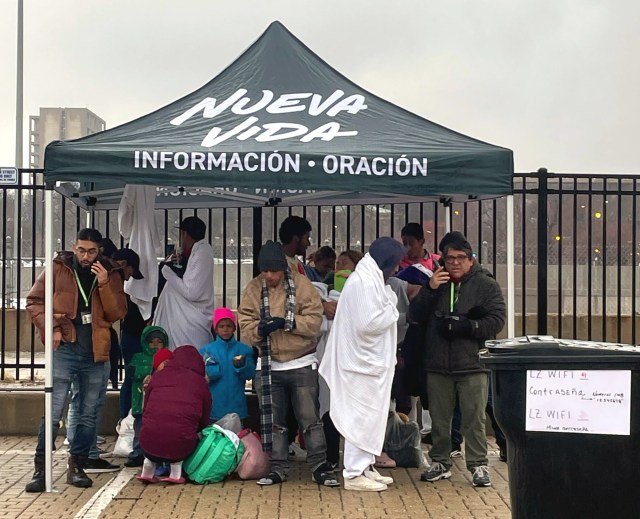 New Life Church
New Life ChurchWhen Lely and her family first visited CityLine Church in the fall of 2022, the Spanish-language ministry was barely two weeks old. It was already buzzing. The family was among more than a hundred migrants from the Holiday Inn who crowded into a room separate from the church’s main sanctuary as pastors cobbled together music and a sermon delivered by an inexperienced preacher.
After worship, the group shared a meal. Lely’s family returned the following week and the week after, and the congregation swelled. As Venezuelans at the hotel began finding work and expanding their range, they met other migrants around the city and invited them to the church.
CityLine leaders moved the Spanish-language service into ever-larger spaces in the building and eventually into the main sanctuary. By the spring of 2023, the church had hired a dedicated pastor for the immigrant congregation. Lely and her husband joined the worship ministry. It felt familiar; Lely had sung at her church back in Venezuela.
CityLine ran headlong into Chicago’s migrant surge. Volunteers delivered meals to migrants sleeping in police stations. Pastors connected with area shelters. The church’s clothing ministry loaned suits to men for immigration court hearings and job interviews. Trained counselors from the church visited the Holiday Inn, providing therapy for migrants who had been sexually assaulted and for couples struggling in their marriages.
“The church grew exponentially because it started to be not just about us,” Lely said. “They started to look for people around the city.”
By early 2023, the state of Illinois was offering stipends to help migrants get out of hotels and into apartments. As families at the Holiday Inn began moving out, CityLine launched another ministry. Much like New Life Centers downtown, the church recruited volunteers to pick up furniture from a local nonprofit to outfit migrants’ apartments.
Friends at CityLine helped Lely’s family rent a place near the church and move in. They helped navigate paperwork. Everything in America is red tape, Lely said. “So many legal things, papers—over there, another there, this one here. Rules, rules, rules,” she said. “It can overwhelm you.”
The biggest “legal thing” CityLine made possible: Lely and her husband were married there last year. They had lived together for years as they sojourned across South and Central America, married in the eyes of God but not the law. It is a common predicament for migrants: No government will grant them legal status, so no government will allow them a marriage license. But in the United States, after applying for asylum, Lely and her man could finally produce enough identification to tie the knot.
In an outdoor ceremony last September, before more than 100 people seated on the church’s lawn, Lely wore a borrowed dress—another gift from the church. She kissed the father of her children for the first time as his lawful wife. “The most anticipated wedding,” she said.
The church, Lely said, became their extended family, their connection to virtually everything else beyond the tiny world of their apartment, communication barriers notwithstanding. “There are a lot of people who speak only English, but I know that they care deeply for me, that their love for me is real,” Lely said. “They won our heart. They helped us in absolutely everything.”
For all the vitality CityLine’s migrant ministry infused into the church—“It has changed us,” said Zachariah, the senior pastor—it also took a toll. At times it all felt like too much, and staff members wanted to quit. The project rubbed some the wrong way in the conservative church, an independent congregation that was once part of Harvest Bible Chapel.
One church member, whose family has since left the church, wrote emails to Zachariah criticizing the ministry as a “social justice experiment.” In his response, Zachariah wrote, “By ‘social justice’ or ‘social gospel’ experiment, do you mean us caring for people who are in need who’ve come to our doorstep asking for help? Because we’ll do that all day long.”
Zachariah has said from the pulpit that America is a land of laws, you should follow the law, and immigration laws exist for a reason. At the same time, Zachariah said, migrants have watched people die along their journey here. Some were robbed and raped. “You could say, ‘Well, they should have never come. They should have stayed home,’” he said. “You could say all those things. But when they’re here, that’s a very mean thing to say to somebody who’s struggling.”
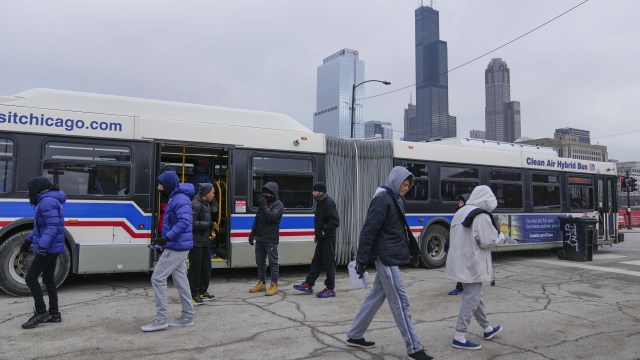 AP Photo/Erin Hooley
AP Photo/Erin HooleyLely’s struggles did not end when the family finally settled into an apartment. Even after they bought a car and her husband tried his hand at various lines of work, including delivery driving, they passed through what she called desert moments. “You say, ‘And now who’s going to protect me? This is where only you, God, can help.’”
There was the time in 2023 when they had a car accident and lost their insurance. Lely’s husband could not work. They were evicted from their apartment for missing their rent, and they struggled to find another landlord willing to take them, given their lack of credit. Then Lely discovered she was pregnant with their fourth child.
Were it not for the church, she said, that stretch might have finished her.
“There is something ingrained in this country,” Lely said. She sees people who seem to possess every worldly good but have still fallen into depression and emptiness. “I mean, if you’re here and you don’t seek God in a serious way, if you don’t submit yourself to God, it’s like a wave that is going to swallow you.”
This year, as the Trump administration targets Venezuelans for deportation and has renewed its vow to tighten the screws on Chicago’s immigrant community, Lely has at times felt that wave swelling closer to her. On one hand, she has undeniably passed through intense joys, has seen how America was obviously a blessing: a place where her husband could work legally while they are being considered for asylum. A place that would allow them to finally marry. A place, after so many years of wandering, where she could finally belong.
“Then this government comes and makes you see everything the other way around,” Lely said. “You don’t belong here. We don’t want you.”
She has seen restaurants emptied and families stay home from church. She has heard her pastor say they lock the doors during the worship service. Attendance at the Spanish-language service is not what it used to be, hovering now somewhere north of 50. Lely’s family is virtually the only one from the original Holiday Inn group that still attends. People come and go for various reasons, Lely said, and they don’t always tell you whether fear has driven them away. But the energy is not what it once was.
Now, Lely thinks more about previously unimaginable hypotheticals—about how her family would afford to live if they had to return to Venezuela with its wrecked economy. Her husband works two different shifts as a janitor, leaving home most mornings at 5:30 and returning around 11:30 at night. “We’re in saving mode. Alert mode. Quiet mode,” she said. “It’s better to have no free time but to have money.”
Recently Lely was talking with a friend who quoted from 2 Timothy, reminding her that God did not give them a spirit of fear but of power, love, and self-discipline. Lely has tried to hold on to that. To block out images that bubble up in which her husband is arrested and she is left alone with four children, in which a voice on a government commercial is telling her to leave the country now or be hunted down.
“It’s what they want,” she said. “To terrorize you.”
Closer to downtown Chicago, Andre Gordillo’s church is also trying to hold back the fear. Gordillo worships at the New Life Church campus in Chicago’s Little Village neighborhood, or “La Villita.” Like CityLine, the congregation saw lives changed as it welcomed migrants from the Texas buses.
“In the last 2 years, we have baptized more people than in the last 20 years,” said Paco Amador, who pastors the Little Village church. He has prayed with people who decided to believe in Jesus. He has officiated a flurry of weddings. His church has planted Bible studies and small congregations in several communities that previously had few Latinos. “I would say that is a revival, or at least the spark of revival.”
As the president has repeatedly promised the largest mass deportation in history, Amador has sometimes laid awake at night, wondering if this will be the end of a miracle God has been doing in his community. “If these mass deportations happen, they would almost end up decimating a revival,” he said.
In early February, for the first time in 15 years, the church locked its doors during worship and posted ushers at the entrance who looked “less Latino and more white,” Amador said. In the past two weeks, even before President Trump vowed anew to target Chicago for immigration enforcement, stories swirled of a growing crackdown in the city. Agents have increasingly detained individuals at routine check-ins with Immigration and Customs Enforcement (ICE) and at court hearings.
Amador said his pastoral team goes back and forth over whether to cancel church activities or to act as if nothing has changed. “There is a sense of constant fear,” Amador said. “Many people have definitely decided to stay home.”
Claudia Vázquez is one of them. Vázquez, who has lived in Chicago for 30 years, runs a cleaning-and-catering business that employs six women and provides tacos for New Life’s summer events. This year, she canceled all 11 of her contracts for outdoor gatherings. Parks and public spaces are too risky. She told her employees, “It’s more important that you be safe. Stay home with your family.”
Vázquez and her elderly mother did not attend the church’s outdoor Father’s Day service, which it traditionally holds at a park on the edge of the neighborhood. Looking at photos of the event, she noticed several other families missing from the undersized crowd.
The morning of the service, at a federal office seven miles west from where the church was worshiping, at least two fathers were detained by ICE after receiving text messages telling them to come to the office for a check-in.
“I fail to see how this makes anything great,” Amador said.
Andy Olsen is senior features writer at Christianity Today.
With additional reporting from Laura Finch in Chicago.

